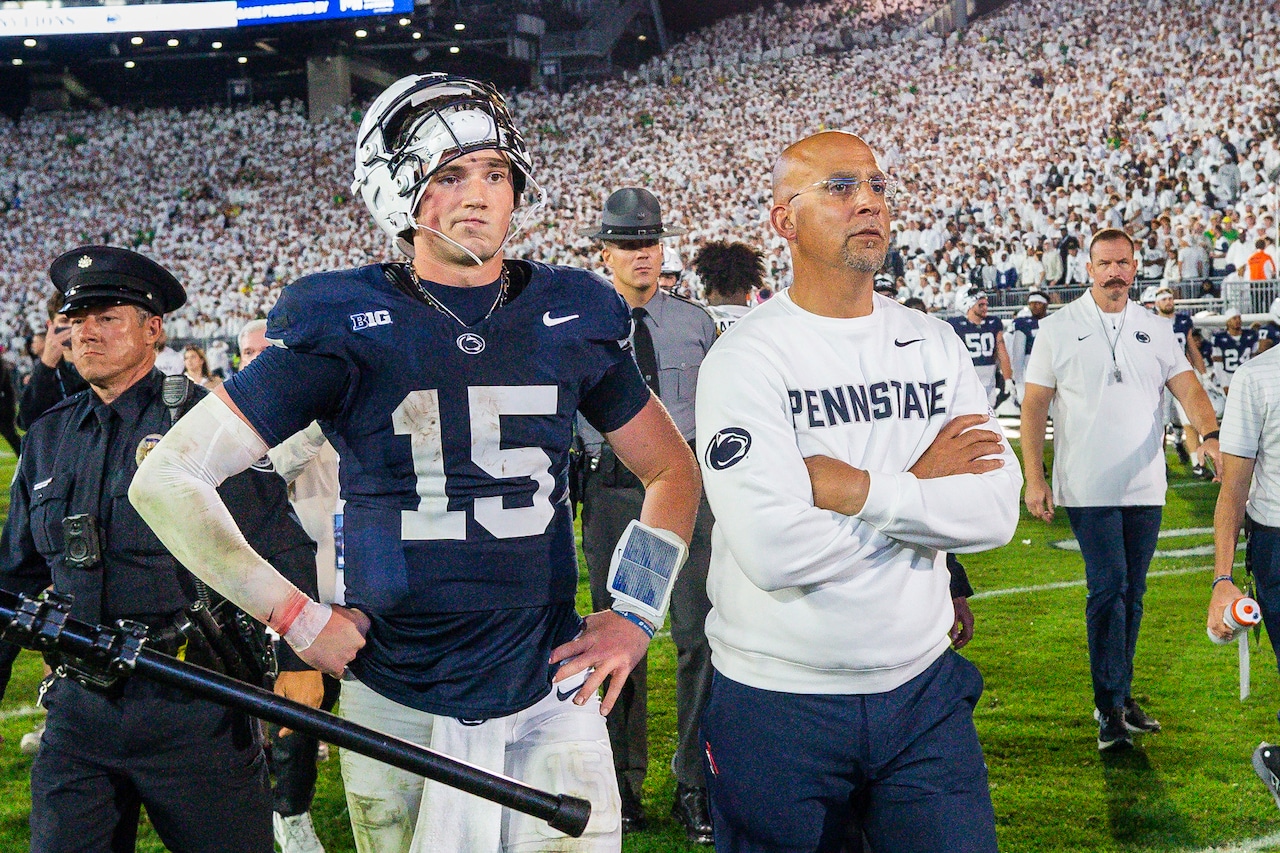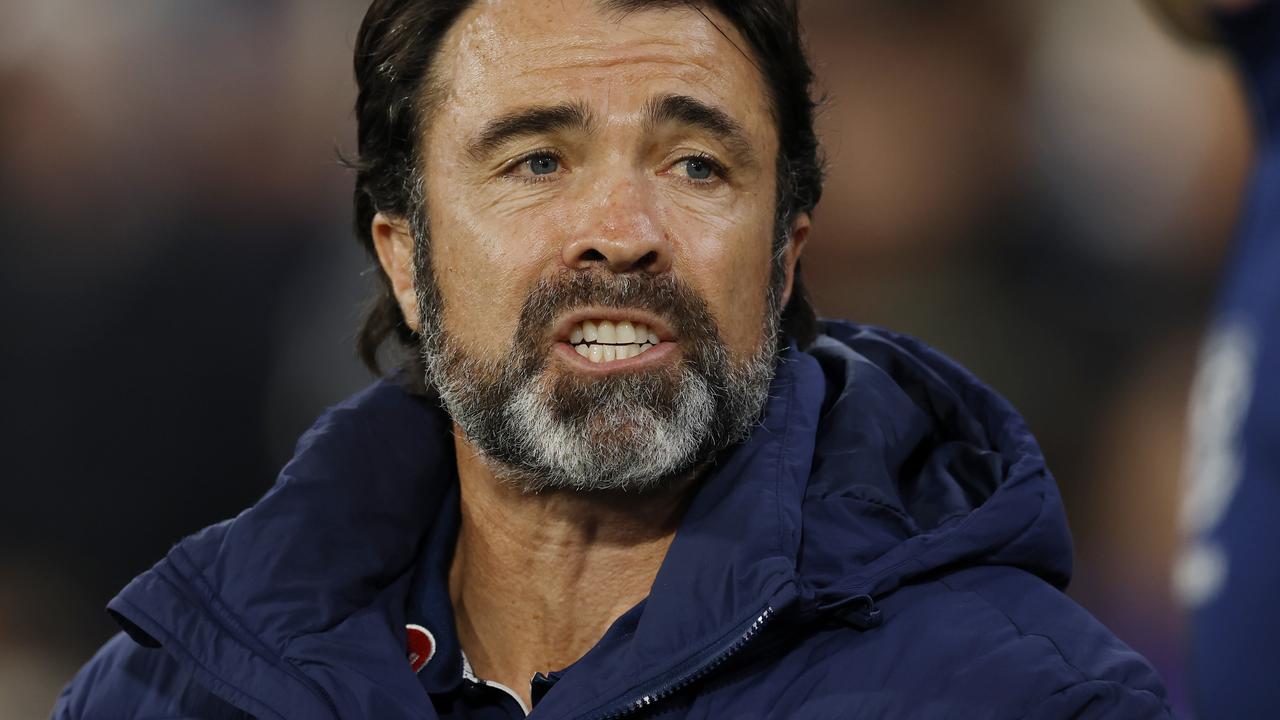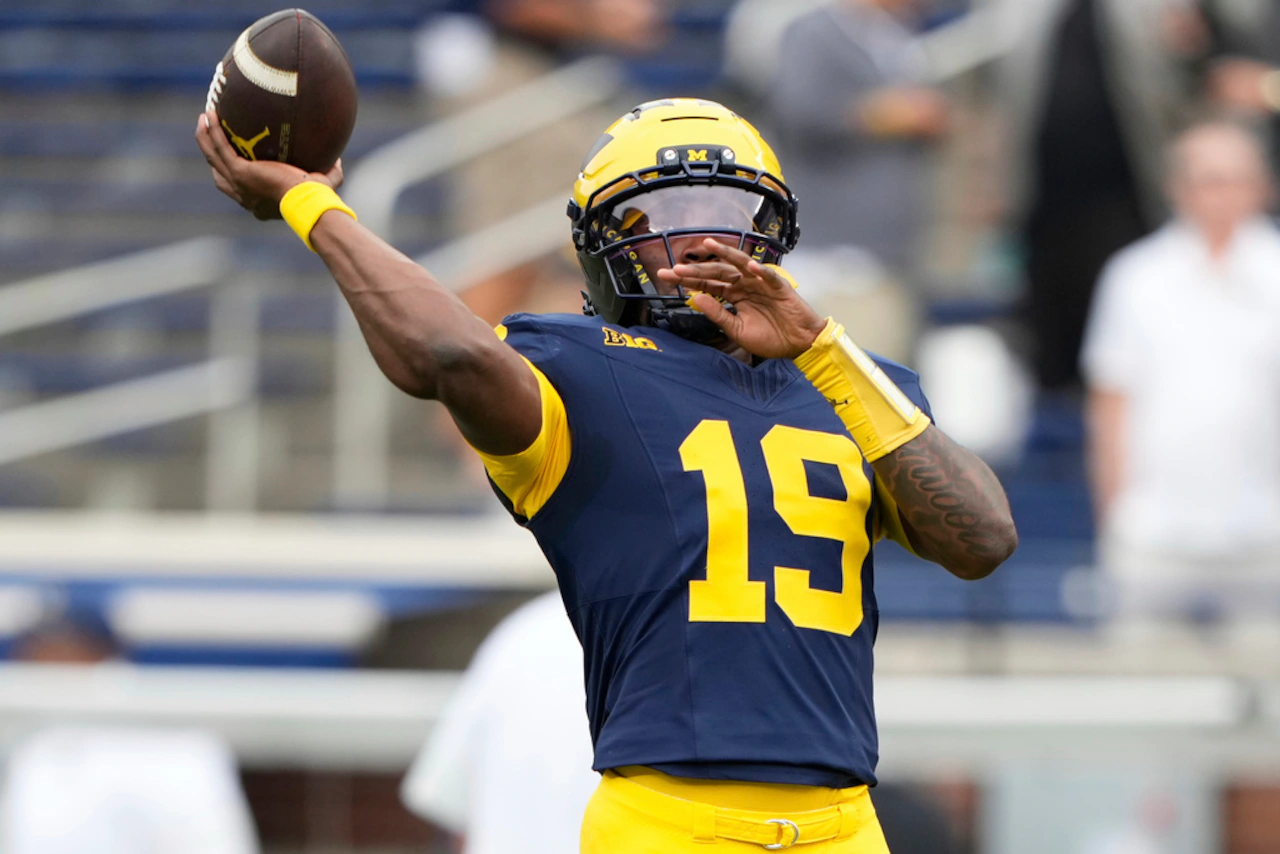
STATE COLLEGE, Pa. — No. 3 Penn State lost to No. 6 Oregon 30-24 in double overtime Saturday night at Beaver Stadium.
James Franklin recapped the first loss of the season for the Nittany Lions (3-1, 0-1 Big Ten).
Below is a transcript of Franklin’s postgame press conference.
JAMES FRANKLIN
Opening Statement
First of all, obviously, you got to give Oregon a ton of credit. Came in here in a very difficult environment and made plays when they had to, so hats off. Got to give them their due. Really, the game came down to what we expected it to come down to. First down was going to be critical in this game. We weren’t able to get anything going early in the game on offense, and then we got into obvious passing situations. Third-and-long, which was not a great situation for our quarterback, was not a great situation for our offensive line. They were able to stay on schedule on first down, get ahead of the sticks, get into third-and-manageable situations. We actually did pretty well on third down, but they were able to go for it on fourth down because it was manageable situations. You know, there’s a couple key plays in the game. Obviously early on; the turnover that we thought we got, that got overturned. Obviously, the turnover at the end of the game. Neither offense was explosive, but we battled, we were resilient, and we had a chance to win the game at the end. I’m proud of the guys in the locker room, obviously disappointed and not satisfied one bit, but I’m proud of the way our guys battled and gave ourselves a chance to win the game at the end. We’re going to watch this tape. I think we’re going to feel like we had tons of opportunities to win this game. There’s going to be a lot to learn from it, obviously. The way college football is today, there’s going to be very few teams that finish the end of the season unscathed. We’ve got to learn from this. We need to have a great week next week. We’ve got to tune out all the noise, and we’ve got to get better from this and get on a roll for the rest of the season.
Q: The frustration of the fans… Do you sense it? And do you get it?
A: Yeah, we have a passionate fan base. 111,000. The environment was awesome. They’re passionate. When we win, there’s nothing better. When we lose, there’s nothing worse. I get it. I get the frustration that comes with a fan base that is invested and cares. I get it.
Q: How would you assess the play of Drew [Allar] from the early struggles to the comeback to ultimately the mistake in the end?
A: Yeah, I thought he battled. Early in the game, I think it’s obviously going to be easy for people to be critical, but again, when you’re not able to have success on first down, you’re not able to get ahead of the sticks on second down. In the first half, I think we averaged almost third-and-nine. That’s not a good situation for any O-line. That’s not a good situation for any quarterback. We were not able to get our running game going, and that put us in a very, very challenging spot. Obviously, the turnover at the end. Drew’s been as good as any quarterback in the country when it comes to touchdown-to-interception ratio over his time, but obviously that was a critical one. But early on, we were not able to get into a rhythm for all the reasons I just mentioned. And now we’re in third-and-long after third-and-long after third-and-long.
Q: Coach, after everything that’s happened versus ranked teams, how do you personally maintain your belief?
A: Again, I kind of look at the entire picture. I get that narrative, and it’s really not narrative, it’s factual. It’s the facts. I get it, you know, but I try to look at the entire picture and what we’ve been able to do here, but at the end of the day, we got to find a way to win those games. I totally get it, and I take ownership, and I take responsibility. At the end of the day, I wanted that for those kids in that locker room. How hard they work, how much they sacrifice. And we had our opportunities. We had our opportunities, but yeah, I take responsibility.
Q: The last three times you’ve had a top 10 opponent here, it’s been a struggle offensively for much of the game. You found something late in this one, but I think 109 yards for three quarters. Is there something you could attribute to that being a consistent shortcoming for your team?
A: In the first half, I didn’t think we did a great job with the line of scrimmage on really both sides of the ball. Back to the point about first down, we were not able to get ahead of the sticks on offense. We were behind the sticks on defense. Obviously, they’re a really good team, and we’re a really good team, and we got to find ways to win those games. I get it, but your point is we played a really good team today, and we struggled to move the ball effectively on offense and I think I expressed why.
Q: It’s not the first time this year we’ve talked about the rhythm thing. Sometimes you’re in it, sometimes you’re not. Same with the third-and-longs. Do you think it’s play calling, scheme, game plan related? Do you think it’s execution related from the field you’ve seen so far, plus what you saw tonight?
A: I think it’s a little bit of all that, right? I don’t think we were executing the way we’re capable of executing. Obviously, we got to do whatever we got to do to manufacture yards. We got to make some plays. It’s all of it. Those things come at a premium when you’re playing really good teams. The margin of error is small.
Q: Can you assess overall the defense? Do you think it got a little tired toward the end? Also, what were you told on the fumble and the return?
A: I think when you talk about how the first half went, our defense was on the field way too much for all the reasons I’ve already addressed. I think that affected them late in the game when we needed to stop. The fumble, to be honest with you, nothing was explained on the sideline. They said that the runner’s knee was down basically before he broke the tackle and kept running when the ball came out.
Obviously, you guys probably had better views of it than I did, but I didn’t get a whole lot more of an explanation than that.
Q: Is it reasonable to suspect that the non-conference schedule didn’t prepare you enough for this?
A: Yeah, I think when you lose this game, that question is coming, right? I don’t think there’s any doubt about that question coming after we don’t play well in this game. Yeah, I get that question.
Q: After the Devonte Ross, 30 seconds left, fourth quarter, touchdown. You go 16-17. Any ideas or conversation to go for two points?
A: No, we were going to have a tremendous environment and a really good opportunity. Obviously, we went down and scored. Felt like we were in a really good position for our defense to get a stop. They made some significant plays. But no, we felt like going to overtime at home with the crowd advantage that we were going to have, would give us the best situation.
Q: I wanted to ask about two more in-game decisions. One, the punt earlier in the game. Were there any thoughts going for it there? And a lot of coaches will go for two on that first touchdown that you scored to make it either a six or an eight-point game. Did you consider doing that?
A: We have the analytics book on the sideline, like everybody does. We went through those scenarios. The punt becomes a challenge when you punt it in the endzone. You go in for a short yardage punt, or a situation where we call a “sky punt”, where you’re going to pin them deep. When you decide not to go for it, and then you punt it into the endzone, then you should have gone for it. That magnifies the decision that you made. In terms of going for two, the rhythm of our offense and where we were at that point, we didn’t feel like that was the right thing to do. Getting to overtime and being at home and the advantage that we had there, we felt like that was the right play. I think the challenge was late in the game, our defense had been on the field too much, and I think we ran out of gas a little bit there at the end.



